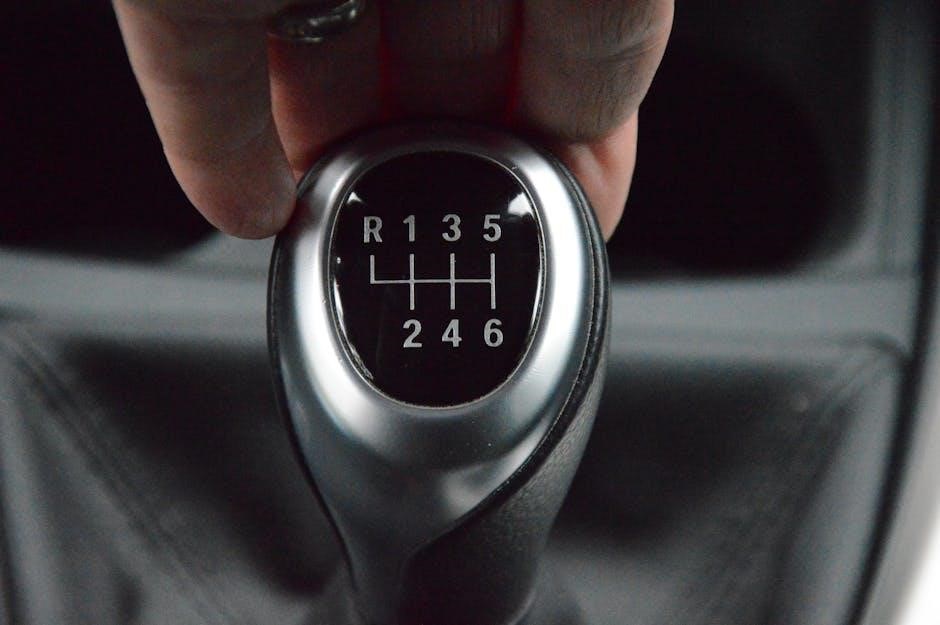kansas commercial driver license manual
Category : Manuals
The Kansas CDL manual is a comprehensive guide for commercial drivers, detailing safety protocols, road rules, and emergency procedures. It ensures responsible and safe driving practices.
1.1 Purpose of the Manual
The Kansas CDL manual serves as a primary resource for commercial drivers, providing essential information to prepare for both written and skills exams. It covers safety protocols, road rules, and emergency procedures, ensuring drivers are well-informed. The manual is crucial for understanding CDL classes, endorsements, and state-specific regulations, helping drivers obtain their license efficiently and responsibly.
1.2 Structure and Content Overview
The Kansas CDL manual is organized into sections covering CDL classes, endorsements, testing processes, and safety guidelines. It includes detailed information on pre-trip inspections, emergency protocols, and state-specific regulations. The manual also provides resources for studying effectively and staying updated on CDL modernization efforts, ensuring drivers are well-prepared for exams and responsible on the road.

Classes of Commercial Driver Licenses (CDL)
The Kansas CDL program offers Class A, B, and C licenses, each requiring specific knowledge and skills based on vehicle weight and type.
2.1 Class A CDL
A Class A CDL in Kansas is required for operating vehicles with a Gross Vehicle Weight Rating (GVWR) of 26,001 pounds or more, towing a trailer over 10,001 pounds. This license allows drivers to operate combination vehicles like tractor-trailers. Applicants must demonstrate advanced driving skills and knowledge of handling large vehicles and trailers. A restriction may apply if the skills test is taken in an automatic transmission vehicle.
2.2 Class B CDL
A Class B CDL in Kansas is required for operating heavy straight trucks with a Gross Vehicle Weight Rating (GVWR) of 26,001 pounds or more. This includes vehicles like dump trucks, buses, and box trucks. A Class B CDL does not allow towing a trailer with a GVWR over 10,001 pounds. Applicants must pass a skills test, and an “E” restriction applies if tested in an automatic transmission vehicle. This license is ideal for intra-state or local delivery jobs.
2.3 Class C CDL
A Class C CDL in Kansas is required for operating small passenger vehicles or HazMat transports. It covers vehicles with a Gross Vehicle Weight Rating (GVWR) under 26,001 pounds but designed to transport 16 or more passengers, including the driver, or hazardous materials. A Class C CDL may require endorsements like Passenger (P) or HazMat (H). Drivers must meet medical certification requirements and be at least 21 years old to apply.

CDL Endorsements and Restrictions
CDL endorsements in Kansas enhance driving privileges for specific cargo types, such as HazMat or passengers. Restrictions like “E” limit operations based on vehicle transmission type.
3.1 HazMat Endorsement
The HazMat endorsement allows drivers to transport hazardous materials, requiring a background check and specialized training. It involves passing a written test and adhering to strict safety protocols. Drivers must understand handling, storage, and emergency procedures for hazardous cargo. This endorsement is critical for ensuring public safety and compliance with federal regulations. Proper documentation and recurrent training are mandatory to maintain this endorsement in Kansas.
3.2 Passenger Transport Endorsement
The Passenger Transport endorsement is required for drivers carrying 16 or more passengers, including the driver. It ensures safe operation of buses and similar vehicles, covering emergency evacuation procedures, passenger safety protocols, and vehicle inspection standards. Applicants must pass a specific knowledge test and demonstrate ability to manage passenger safety. This endorsement is vital for public transportation roles, emphasizing driver responsibility and adherence to strict safety guidelines.
3.3 Tanker Operations Endorsement
The Tanker endorsement is for drivers operating tanker vehicles transporting liquids or gases. It covers safe handling, loading, and unloading procedures, as well as emergency response strategies for hazardous situations. Drivers must pass a specialized knowledge test and demonstrate ability to manage cargo securement and vehicle stability. This endorsement ensures proficiency in mitigating risks associated with transporting bulk liquids or gases, enhancing safety on the road.

CDL Testing Process

The CDL testing process includes knowledge and skills assessments to ensure drivers are qualified and safe to operate commercial vehicles, covering both theoretical and practical competencies.
4.1 Knowledge Tests
The Kansas CDL knowledge tests assess a driver’s understanding of safety protocols, traffic laws, and vehicle operations. The exams cover general knowledge, air brakes, and combination vehicles. Additional tests are required for endorsements like HazMat, tanker operations, and passenger transport. Drivers must score at least 80% to pass. The manual provides detailed study material to help applicants prepare for these written examinations, ensuring they are well-informed and ready for safe commercial driving practices.
4.2 Skills Tests
The Kansas CDL skills tests evaluate a driver’s ability to operate a commercial vehicle safely. The test includes a pre-trip inspection, basic vehicle control exercises, and on-road driving assessment. Drivers must demonstrate proficiency in inspecting the vehicle, maneuvering in tight spaces, and navigating various road conditions. The manual provides a detailed pre-trip checklist and tips to help applicants prepare for these practical evaluations, ensuring they meet state and federal safety standards.
4.3 Pre-Trip Inspection Requirements
The Kansas CDL manual outlines a detailed pre-trip inspection checklist to ensure vehicle safety. Drivers must check brakes, tires, lights, mirrors, and hydraulic systems before operation. The inspection process is designed to identify potential issues, preventing accidents and ensuring compliance with federal and state regulations. The manual provides step-by-step guidance to help drivers perform thorough inspections efficiently and effectively, emphasizing safety and preparedness.

Safety Information and Emergency Procedures
The manual provides critical safety information and emergency procedures, ensuring drivers are prepared for hazardous situations. It emphasizes responsible driving practices and quick response techniques to maintain road safety.
5.1 Accident Procedures
The manual outlines essential steps to follow after an accident, including securing the scene, exchanging information, and reporting incidents. Proper documentation and notification of authorities are emphasized. Understanding legal obligations and procedures ensures compliance with Kansas regulations, promoting safety and accountability for commercial drivers in emergency situations.
5.2 Emergency Protocols
The manual details emergency protocols for commercial drivers, emphasizing quick response and safety. Drivers must remain calm, assess injuries, and provide first aid if trained. Securing the vehicle and notifying authorities are critical steps. Proper use of emergency equipment and adherence to Kansas regulations ensure safety and compliance during unexpected incidents on the road.

Kansas State-Specific Regulations
Kansas enforces unique CDL rules, including specific operational days for testing locations and residency requirements. The state mandates obtaining a Kansas CDL within 90 days of relocation.
6.1 CDL Fees and Requirements
In Kansas, CDL fees vary based on the license class and endorsements. The standard CDL application fee is $26, with additional costs for endorsements. Military personnel and farmers may qualify for discounted rates. Applicants must provide proof of residency and complete vision and medical certifications. Fees are non-refundable and must be paid at the time of application. These requirements ensure compliance with both federal and state regulations.
6.2 Driver Disqualifications
Driver disqualifications in Kansas occur for severe offenses, such as DUI, reckless driving, or multiple speeding violations. Certain medical conditions may also lead to disqualification. The duration varies, with some offenses resulting in a 60-day suspension, while others, like felony convictions, may cause lifetime bans. Federal regulations further enforce these standards to ensure public safety. Disqualifications significantly impact a driver’s ability to maintain CDL credentials and employment in commercial driving roles.
6.3 CDL Locations and Testing Days
Kansas CDL testing locations operate Tuesday through Friday, offering both knowledge and skills tests. Offices are closed on weekends (Saturday-Monday). Applicants can visit the Kansas Department of Revenue’s website for a detailed list of locations and specific testing availability. Ensure to check local office hours and requirements before visiting to streamline the testing process efficiently.
Modernization of the CDL Program
The Kansas CDL program has been updated with a modernized pre-trip checklist and enhanced skills test instructions, ensuring safer and more efficient commercial driving practices statewide.
7.1 Updated CDL Pre-Trip Checklist
The updated CDL pre-trip checklist ensures thorough vehicle inspections, covering tires, brakes, lights, and fluid levels. It streamlines the process, enhancing safety and compliance with federal standards. Regular inspections help drivers identify and address issues before hitting the road, reducing risks and ensuring optimal vehicle performance. This modernized checklist is a critical tool for maintaining road safety and meeting regulatory requirements in Kansas.
7.2 Modernized Skills Test Instructions
The modernized skills test instructions outline updated procedures for evaluating commercial drivers. They include detailed scoring criteria, specific maneuvers, and a focus on safety protocols. Tests are conducted in a controlled environment, assessing vehicle control, parallel parking, and three-point turns. Candidates must demonstrate proficiency in these areas to qualify for their CDL. The updated instructions aim to ensure consistency and fairness in the evaluation process across Kansas.

Studying and Preparation Tips
The Kansas CDL manual is your essential guide, offering detailed information on commercial driving laws, safety practices, and effective test preparation strategies for success.
8.1 Utilizing the CDL Manual Effectively
The Kansas CDL manual is an essential resource for mastering commercial driving knowledge. It covers safety information, emergency procedures, and state-specific regulations. By studying the manual, drivers can understand the requirements for endorsements and restrictions, ensuring they are well-prepared for the CDL exam. Regular review of the manual helps reinforce key concepts and promotes safe, responsible driving practices on Kansas roads.
8.2 Recommended Study Resources
The Kansas CDL manual is complemented by online practice tests and guides. Utilize the Kansas CDL Manual PDF for detailed information on endorsements and restrictions. Additionally, online platforms offer practice tests to reinforce knowledge and identify areas for improvement. The AAMVA Model CDL Manual and official state websites provide further resources to ensure comprehensive preparation for the CDL exam. Regular practice and review are key to success.

Additional Resources
The Kansas CDL manual is supported by online resources, including downloadable PDF versions and practice tests. These tools enhance study efficiency and exam preparation.

9.1 Downloading the Kansas CDL Manual PDF
The Kansas CDL manual PDF is readily available for download from the official state website, offering a convenient format for offline study. It includes updated rules, regulations, and testing requirements, ensuring drivers are well-prepared for their exams. The PDF version allows for easy navigation and accessibility, making it a valuable resource for those seeking to obtain or renew their commercial driver’s license in Kansas.
9.2 Online Practice Tests
Online practice tests are an excellent tool for preparing for the Kansas CDL exam. These tests simulate real exam conditions and cover essential topics such as road safety, vehicle inspection, and endorsement-specific questions. By taking these tests, drivers can assess their knowledge, identify weak areas, and improve their readiness for the actual exam. Many websites offer free or premium practice tests tailored to Kansas CDL requirements, ensuring a comprehensive and convenient study experience.
